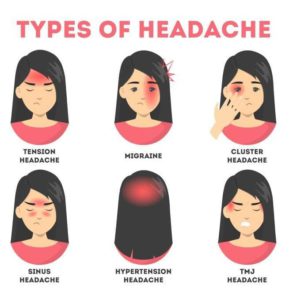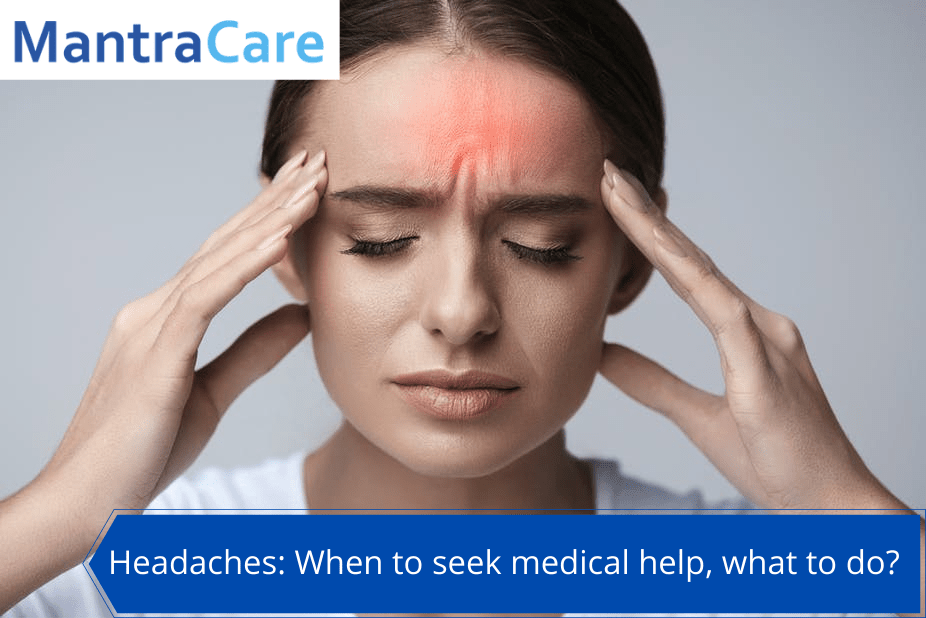We all face headaches at some point of time in our life, and we also have some home remedies to it that may include taking painkillers, taking rest, consuming extra water, or sometimes waiting to get subside on its own. But sometimes, headaches can be more complicated than we realize.
Most headaches happen in the nerves, blood vessels, and muscles that run in a person from head to neck. There are times, when the muscles or blood vessels swell, tighten or go through other changes in the body and put pressure on them. The nerves send the pain messages to the brain, which eventually causes us a headache.
Contents
Types of Headaches
The headaches can be categorized based on the cause, duration, and intensity of the pain.
If you’re facing these alongside the headache- stiff marketing, rash, vomiting, confusion, slurred speech, paralysis in any part of your body, or visual loss then you require proper medical advice.
There are approx. 150 types of headache, but here the most common types of headaches are discussed

1) Tension Headaches
In the lifestyles we are leading these days, we get tense on minor problems which result in tension headaches. It is mostly a common type of headache among adults and teens. They cause moderate pain and get over with time. There’re no symptoms of this kind of headache.
2) Migraine Headaches
It’s described as a striking or throbbing pain that can last from 4 hours to 3 days. Along with the pain, you‘ll also experience symptoms such as sensitivity to light, noise, and smells; nausea or vomiting; upset stomach, and belly pain. If a child is facing a migraine, they’ll start feeling dizzy, face an upset stomach, etc. Some of the children also face digestive symptoms such as vomiting etc.
3) Cluster Headaches
This headache occurs in a cyclic pattern or a cluster period. You will experience this headache in the middle of the night with intense pain (like burning or piercing). The headache will also affect your eyes like pupil will get smaller, the eye will turn red, eyelid droops.
As the word “cluster” means “the groups”, so cluster headache also tends to happen in groups. The headache will happen one to three times per day during a cluster period which may last long from 2 weeks to 3 months. The headache will wake you up from a deep sleep, and will completely disappear for months or years, and then come back later. Fortunately, cluster headaches are not life-threatening and are rare in humans.
Symptoms of cluster headaches
Severe pain which occurs behind or in the eye, restlessness, excessive tearing, redness of your eye on the affected side, stuffy or runny nose on the affected side, forehead or facial sweating on the affected side, pale skin (pallor), or flushing on your face, swelling around your eye on the affected side and drooping eyelid on the affected side.
4) Chronic Daily Headaches
Most people get headaches time-to-time, but if the headaches occur on daily basis, then they can be chronic daily headaches. This headache can last up to from 15 days to 3 months.
There are basically four types of chronic daily headaches:
Chronic Migraine
This type of headache occurs in people who have a family history of episodic migraines. In this headache, you will face symptoms like nausea, vomiting, and sensitivity to light.
Chronic Tension-type Headache
This type of headache will affect both sides of your head and cause pain that feels pressing or tightening.
New Daily Persistent Headache
This headache comes on suddenly and usually in people without a headache history. It can affect both sides of your head and cause mild to moderate pain.
Hemicrania Continua
The headache can affect one side of the head and can become severe with migraine-like symptoms.
5) Post-traumatic Headaches
It is the headache that develops within 5-7 days of the injury or after regaining consciousness. It happens because of the muscle tensing that happens during the injury, or when the blood vessels get narrow. This kind of headache will feel the same as a migraine.
Symptoms of post-traumatic headache-Pain in the pulses, nausea, and vomiting.
Less common headaches – Few headaches are primary in nature, but are less common. These kinds of headaches are distinct in nature such as unusual duration or pain associated with a certain activity.
Types Of Less Common Headaches
1) Exercise Headache
This headache occurs during or completion of strenuous and tough tasks such as running, rowing, tennis, swimming, and weightlifting.
2) Hemicrania Continua
The pain of this headache is unstoppable, and will not cause pain on one side of the brain. People with this headache face dull ache or throb that’s interrupted by pain that is jolting, sharp, and stabbing. These kinds of attacks may come from three to five times a day and will last long up to 3 months.
3) Hormone Headaches
The headache comes when there’s a hormonal change in your body such as during periods, pregnancy, and menopause. Sometimes, it happens when there’s a consumption of birth control pills or hormone replacement therapy.
4) New Daily Persistent Headaches (NDPH)
Doctors are not sure about the cause of this type of headache. These kinds of headaches occur when someone gets strikes by flu, illness, or surgery.
Causes of Headaches
1) Stress
Emotional breakdown or depression can cause stress, or skipping meals, overuse of alcohol, changes in the sleeping pattern, or taking too much medication can cause a headache.
2) Environment Issues
The place where you’re spending your time plays a vital role. If that environment has a strong smell of chemicals, perfumes, or some noise, weather can also become a possible trigger for headaches.
3) Genetical Disorders
Headaches like migraine headaches run from family to family. The children and kids who get migraine headaches often get this from their ancestors. If both the parents have a history of migraines, then the kid also has a risk of 30-40% of getting a migraine.
4) Illness
Headaches include infections, colds, and fevers. In some cases, headaches can result from a blow to the head or a sign of a serious medical problem.

Headache Diagnosis
In order to find the right treatment for your headaches, you need to consult a proper medical team. Your doctor will ask some questions regarding your headache history so that the doctor can get a full image of the problem.
Some of the questions which can be asked by the doctor are given below –
- How old you were when the headaches started
- How long you’ve had them
- If you have a single type of headache or multiple types
- How often do you get them
- What causes your headaches (for example, certain situations, foods, or medications)
- Who else in your family has headaches
- What symptoms, if any, occur between headaches
- If your school or work performance has been affected
Points To Remember During The Treatment
Once you start with the treatment procedures, you need to keep track that how well your treatment is processing. It is recommended to keep a note on the diary about the pattern and changes you feel. And consult your doctor that what is not working for you. And it is important to stick to a healthy routine such as regular exercise, getting enough sleep, eating a healthy diet, etc.
A Word From Mantra Care
Your mental health — your psychological, emotional, and social well-being — has an impact on every aspect of your life. Positive mental health essentially allows you to effectively deal with life’s everyday challenges.
For more information, please contact MantraCare. Stress can have both physical and mental effects on the body, leading to negative consequences such as anxiety, depression, and even physical illnesses. If you have any queries regarding Online Stress Counseling experienced therapists at MantraCare can help: Book a trial Stress therapy session


